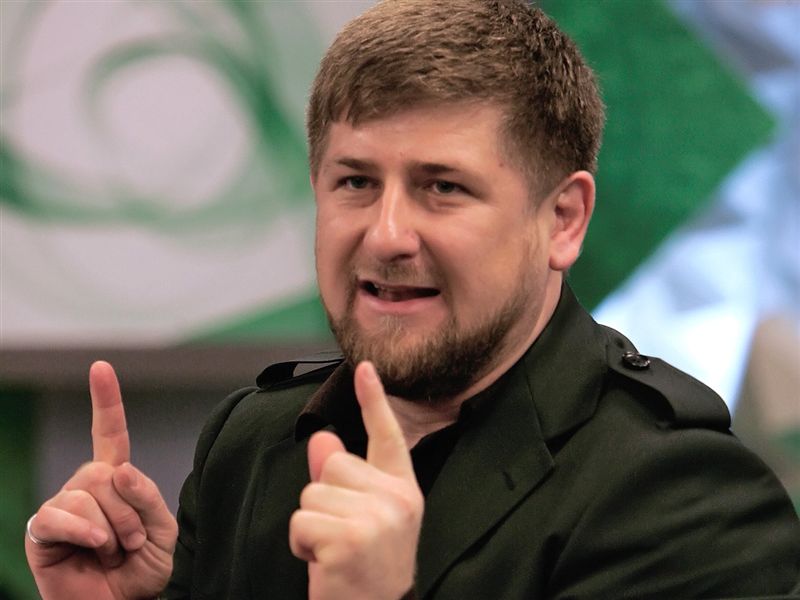
After Silencing Criticism in Chechnya, Kadyrov Moves on to the Rest of Russia
Publication: Eurasia Daily Monitor Volume: 7 Issue: 23
By:

On February 2, Chechen President Ramzan Kadyrov’s lawyer Andrei Krasnenkov announced that Kadyrov had appealed to prosecutors to launch a criminal case against Lyudmila Alekseyeva and Vyacheslav Izmailov on defamation charges. According to Krasnenkov, at a May 2008 press conference Alekseyeva made the statement: “Kadyrov’s gangs roam Chechnya, killing, kidnapping people, doing whatever they want to do” (www.gazeta.ru, February 2).
Lyudmila Alekseyeva is a veteran dissident and human rights activist who heads Moscow Helsinki Group. Vyacheslav Izmailov is a military observer for the Russian liberal newspaper Novaya Gazeta. Both Alekseyeva and Izmailov have been extensively working on the issue of human rights abuses in Chechnya in recent years.
The head of the authoritative human rights center Memorial, Oleg Orlov, who himself lost a similar case against Kadyrov in a Moscow court, commented that Kadyrov had new tactics: “to shut up everyone who unfavorably speaks about Kadyrov.” On October 6, 2009, a Moscow court ordered Memorial to pay $1,700 and Orlov to pay the sum of $700 to Kadyrov as compensation for libel against him. Earlier, in April 2009, Kadyrov had sued Novaya Gazeta, won in court and was awarded nearly $4,000 from the paper and Izmailov.
“It is good that Kadyrov decided to resolve arguments using legal mechanisms and not some others,” Orlov said, adding in reference to Kadyrov’s intention to prosecute the 82-year-old Alekseyeva: “After Kadyrov permitted himself to say wicked things about Estemirova, settling scores with a slain woman who had defended Chechnya’s inhabitants and was murdered for defending their rights, I can expect anything from him” (www.gazeta.ru, February 2).
The renowned human rights activist Natalya Estemirova was killed on July 15, 2009 after being threatened and harassed by the Chechen authorities. The rationale behind the Chechen government’s dislike for her may have been that she reported an increase in human rights violations in the republic following Moscow’s decision to lift the counter-terrorism regime in Chechnya in April 2009. She was undoubtedly the person most vocal about human rights violations in the republic and therefore had spoiled the image, promoted by both Moscow and Grozny, of a “pacified Chechnya.”
On February 2, court proceedings in Kadyrov’s suit against Novaya Gazeta started in Moscow. Kadyrov is demanding more than $300,000 in damages from the paper. Kadyrov’s lawyers insist Novaya Gazeta had no grounds to imply that Kadyrov had been involved in the killings of his former bodyguard Umar Israilov in Vienna, Austria in January 2009 and human rights defender and the lawyer Stanislav Markelov in Moscow later that same month. One of Kadyrov’s witnesses is Magomed Khambiev, the former defense minister of the de facto independent Chechen Republic Ichkeria government who eventually defected to Kadyrov’s side. Khambiev stated in court that Novaya Gazeta’s report about his relatives being tortured to ensure his surrender was wrong. Indeed, Khambiev said he had played billiards with Kadyrov several times in the basement of the Chechen leader’s house and had not seen any secret prisons. Novaya Gazeta’s Deputy Editor-in-Chief, Sergei Sokolov, said in an interview after the hearing that under Kadyrov, Chechnya has conquered Russia, not vice versa. “The trial over our newspaper may show whether Chechnya will also be able to conquer all of the Russian judicial system to a great extent,” concluded Sokolov (Deutsche Welle, February 2).
Meanwhile, unconditional support for Kadyrov might be waning in the Kremlin. According to Grigory Shvedov, the Editor-in-Chief of Kavkazsky Uzel (Caucasian Knot), there is a strong understanding and a certain degree of recognition among Russian experts that Moscow does not control the situation in Chechnya. Moreover, he said, it is recognized that the number of rebels in the republic is actually growing, as the extremists manage to recruit not only young people from marginalized, impoverished families, but also from the prosperous and well-to-do layers of Chechen society. According to Shvedov, it appears that even though the Kremlin does not have clear plans about what to do in the North Caucasus, there is an inclination to start a limited discussion with some of the opposition forces in the region, including moderate Islamists (Shvedov’s address to the Center for Strategic and International Studies in Washington DC, February 1).
If Russian decisions-makers really try to take a new approach, Kadyrov may well find himself in a difficult position, and he will have to either adjust to the new realities or challenge them.
Kadyrov’s future may be intimately intertwined with the future of relations between the all-powerful Russian Prime Minister Vladimir Putin, and its weak President Dmitry Medvedev. Grigory Shvedov claims that Ramzan Kadyrov expected and was very close to being appointed the Russian president’s envoy to the Southern Federal District or the newly-created North Caucasus Federal District. So, Aleksandr Khloponin’s surprising appointment to lead the North Caucasus Federal District in January can be perceived as a setback for the ambitious young president of Chechnya and an oblique sign of conflicting views among the top Russian policy-makers.
Still, the facts suggest that the Russian government as a whole continues to support Kadyrov’s rule in Chechnya unequivocally. At a meeting with Ramzan Kadyrov on February 2, the director of the Rosneft oil company, Sergei Bogdanchikov, unveiled plans to launch an oil refinery and natural gas production facility in Chechnya by 2013, with construction to start in 2011. The new facility is expected to process one million tons of oil and produce 12,000 tons of natural gas, three times more than the current levels of gas consumption in the republic (www.kommersant.ru, February 2). The volatility of oil prices might force Rosneft to curtail its plans but, if implemented, they would allow Chechnya’s ruler to have even more financial resources and leverage than he currently has. Experts estimate oil reserves in Chechnya at around 100 million tons and natural gas at up to 9-11 billion cubic meters (www.mineral.ru, October 14, 2004).
The question as to whether Kadyrov achieves the upper hand in his legal battles against Russian human rights activists or eventually loses out will have far reaching consequences for both Chechnya and Russia.




